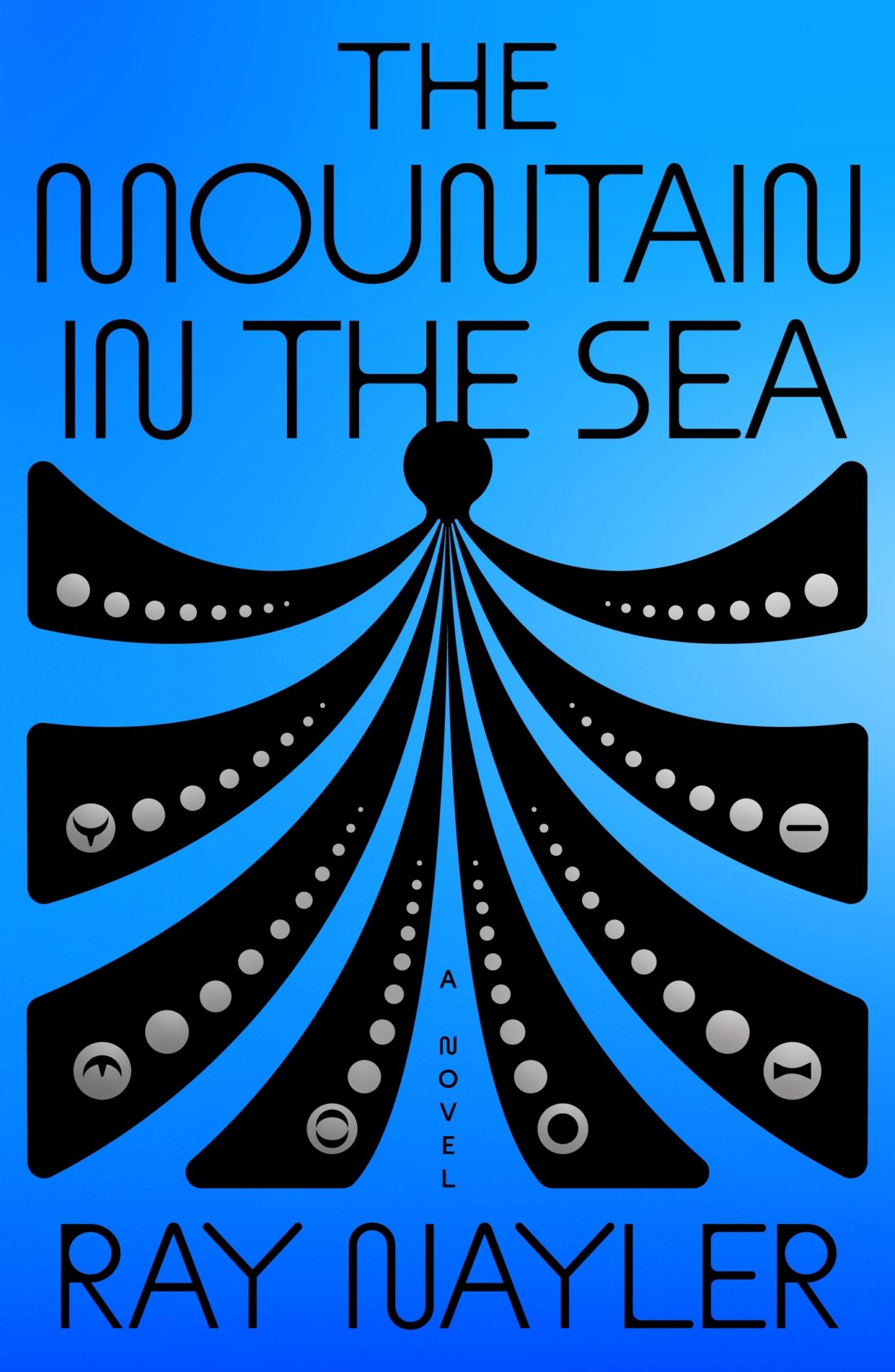The Mountain in the Sea by Ray Nayler

Ray Nayler, The Mountain in the Sea cover, 2022 [courtesy of Farrar, Straus and Giroux].
Share:
As naturalist Sy Montgomery writes in her nonfiction book The Soul of an Octopus, “To many people, an octopus is … an alien from a distant and menacing galaxy.” She thus pinpoints the sheer otherness of these too-many-limbed invertebrates, which has taken hold of numerous imaginations—including mine. As a monster-obsessed child who grew up with the Godzilla films, my holy trinity comprised skyscraper-sized carnosaurs, city-leveling Pteranodons, and any gargantuan thing with tentacles. In my first close encounter with an actual octopus, though, the animal proved to be more modest than almost any cinematic one but equally indelible: a specimen preserved in a jar that remained, for years, atop the display case of my dad’s go-to fishmonger.
My own feelings about monstrousness, a lifelong fixation upon cephalopods at large (so to speak), and the fate of that long-ago by-catch in its see-through tomb all informed my reading of Ray Nayler’s astute first novel, The Mountain in the Sea. Its chief protagonist, Ha Nguyen, arrives one chapter in, via hexcopter, during a storm. She steps from the drone aircraft onto an island in the Côn Đảo archipelago. There, she uses science and technology to pursue something that nameless, faceless competitors simultaneously chase through technology and murder: the so-called Côn Đảo Sea Monster.
Nayler reasonably withholds exactly why Ha and her often less-than-collegial compatriots—Evrim, a Spocklike humanoid artificial intelligence, and Altantsetseg, the badass war veteran/protector of their “Global Conservation Park” workplace—investigate what proves to be a sapient breed of octopus. Likewise, the author cloaks the motivations of parties who lethally suppress even anecdotes about the octopodes—and of a globe-hopping hacker named Rustem, whom that cabal employs. Only in the novel’s third narrative braid does Nayler give us a straightforward conflict—a harrowing one between an illicit AI-run trawler and its brutally enslaved crew of kidnappees.
Despite its purposeful expository drip, The Mountain in the Sea compels over much of its length with settings made vivid through shrewd detail and extrapolative vigor. We never learn what Ha’s field is, but between some chapters we get snippets of How Oceans Think, her book that conveys her focus and philosophy. The character grows vicariously tragic as we find the seas that gave her a career to be even worse off than they are in the real world: fished to the brink or, worse, poisoned by desperate people at limits of their own. Other such intercalary passages take the form of excerpts from Building Minds, a volume by Arnkatla Mínervudóttir-Chan, Evrim’s creator and possibly the richest (as well as the smartest) person in this imagined world. Ha’s trip from the airfield takes her past “fencing flossed with razor wire” to a dilapidated hotel where “torn curtains bled through broken windows”—her new home. Its grounds feature a quasi-Ballardian essential: a derelict swimming pool turned swamp.
Ray Nayler, The Mountain in the Sea, detail, 2022 [courtesy of Farrar, Straus and Giroux].
The sought-after mollusks here turn out to be capable of intraspecies communication via integumentary semaphore—that is, like real-world octopodes, they can control the coloration of their skins; unlike real animals, Nayler’s can manifest and overlay geometric shapes there that their kith can interpret and reply to in kind. More menacingly, whereas a real octopus can manipulate (or tentaculate) human-made locks and scuttle across open ground, Nayler’s can loom to human height atop its limbs and walk on land, sharpen objects and wield them like knives, and alter its submerged body to mimic lots of things. The shapeshifting Greek god Proteus, whom Homer dubbed the Old Man of the Sea, comes to mind.
Here, then, lies the true challenge that the novel dramatizes. Ha, Evrim, and Altantsetseg must somehow communicate with a creature whose ancestors likely diverged from humans’ in Cambrian prehistory, roughly half a billion years in the past. Each of them must do so while also navigating personal and interpersonal waters, plus the literal ones where Octopus sapiens dwells (but does not exclusively stay). In genre terms, Nayler has crafted a first-contact tale around the most credible alien imaginable—one you could see in vivo at the nearest major aquarium. Ha—who grew up as an orphan—comes to the job with a burden of guilt, plus estrangement from her own species. Altantsetseg—unparalleled at operating the nature sanctuary’s defensive drone armada—is scarred and battle-hardened, and she shelters her self behind an outmoded voice translator that produces such utterances as “Weather is shitting rain.” Evrim—who lacks genitals and identifies as nonbinary while, ironically, possessing a mind based upon binary code—proves nevertheless to be as problematically temperamental as their human counterparts. One of the Ha intercalaries mirrors the trio’s problem this way:
If we accidentally send out signs to a shark that indicate we are prey … we know we may instigate an attack ….
How we see the world matters—but knowing how the world sees us also matters.
So, were the whole round world itself a sapient thing, how would it see humanity? As an internecine infestation of parasites with so little regard for their host that, even as it suffers fevers rendering its hide useless to anything living, they continue to shit where they eat, fart where they breathe, and vomit poison where they live? And lest that rhetorical question make you wonder how I see humanity, note that I have significant fondness for numerous individuals (some living, others not) but view the species overall as an ecocidal menace. I would tell you that Nayler’s characters all reach equally uncomfortable conclusions, but some of them start in that mindset. Are all other species therefore doomed because of our weedy ways (with apologies to flora everywhere for such an invidious, anthropocentric comparison)? Or will they be caught in some monstrous crossfire between “ecoterrorists” and “speciesists”? Allow me to speculate upon Nayler’s breathtaking speculations here and wonder if AI might prove the most durable torchbearer for human culture; whether such an entity would value that legacy, however, or any genetic legacy, is anyone’s guess. Let me also vent a fear that I suspect many people share but voice only reluctantly: Without some paradigm-shifting change in the way we live now, that jugged octopus from my childhood might typify how generations to come encounter all wildlife. Such a prospect haunted me even before I read this novel, and in its wake, I feel fitful hope, at best.
How much value readers place on plotting may determine how warmly they receive The Mountain in the Sea. I found that the belated revelation of stakes for Nayler’s main characters sapped some energy in the novel’s earlier passages—though I don’t see how else he could have done things without betraying his meticulous unfolding of those characters. He wraps things up altogether too tidily here, and he makes some of his parallels a bit too overt. Despite those lapses, though, Ray Nayler demonstrates an economical elegance in this fictitious future, and he populates it memorably throughout. Whatever he chooses to do next I await in a state of absolute eagerness. Here’s hoping he gets to write, for decades to come, in a world less dire than his own imaginings.
Edward Austin Hall co-created Hunter: The Reckoning in 1999 for White Wolf Game Studio and recently contributed to that roleplaying game’s fifth edition; his game writing also appears in Blackbirds (Andrews McMeel, 2022). He co-edited the 2013 anthology Mothership: Tales from Afrofuturism and Beyond, a book acknowledged in a front-page NPR.org story headlined “Sci-Fi Has Changed A Lot In The Past Decade—These 7 Reads Will Show You How.” Gumbohaus published Dread Isle, Hall’s first novel, in 2020. His new novelette, Green Treacheries, appears in a just-released anthology of Atlanta-set fantastical fictions called Terminus 2.
